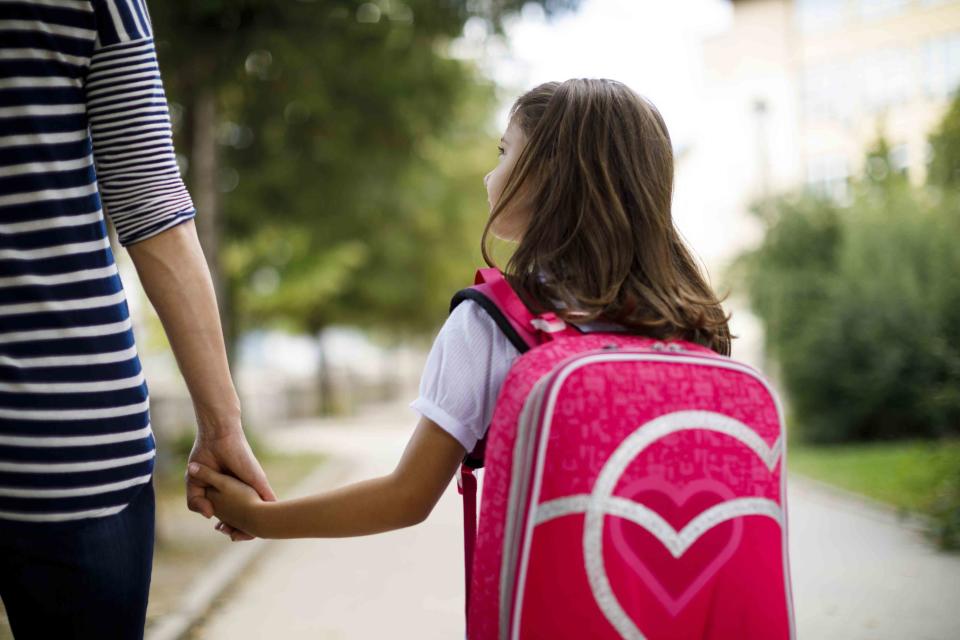Yes, It’s Normal for Your Kid To Have End-Of-School-Year Sadness—Here’s Why
It can feel like a big change for some kids. Here's what experts say parents can do.

GettyImages/damircudic
Fact checked by Sarah ScottFact checked by Sarah Scott
For many kids, the last day of school is an event they count down to with glee. But for others, this milestone can bring on sadness. My elementary school-aged daughter falls into the latter category.
Every year, on the last day of school, I know to brace for the tears. For a few days after she says goodbye to her teacher and classmates, she’s pretty down, and misses her routine in the classroom. Eventually she shakes off her lamentations and embraces summer fun. But I always wish I knew what to say other than, “It’s OK, honey”—and how to better help her with her end-of-the-school-year blues.
It turns out that feeling a sense of loss at the end of a school year is pretty common, and happens for a variety of reasons. “Children's propensity to grow attached to teachers and peers or feel anxious about changes can be influenced by several factors," says Amanda Gummer, PhD, child development expert and founder and CEO of Good Play Guide.
Among those factors are:
Personality. Some children naturally form strong emotional bonds and are more sensitive to changes in their social environment.
Previous experiences. Kids who have experienced instability or loss in their lives may develop a heightened need for security, making them more attached to familiar people and routines.
Social skills. Children who find it challenging to make new friends may rely heavily on established relationships with teachers and peers, leading to greater anxiety about change.
Home environment. A supportive and communicative home environment can help mitigate anxiety, while a stressful or unpredictable home life might exacerbate feelings of insecurity and attachment to school figures.
“Especially for children in need, school is a safe and stable environment and losing this can cause anxiety, stress, and sadness," adds Pamela Mastrota, executive director of The Toy Foundation, a children's charity part of The Toy Association.
How To Help Your Kid Through End-Of-School-Year Sadness
If you find that your child is struggling as the end of school draws near, Dr. Gummer advises trying to understand why they feel this way—and making sure they know it’s OK.
“Validate your child's emotions by acknowledging that it's normal to feel sad or anxious about the end of the school year,” she says, adding, “Encourage them to express their feelings through conversation, drawing, writing, or role playing.”
Indeed, like with many big emotions, simply engaging your child in play or activities they enjoy can help them work through their feelings. “Providing daily playtime in an environment the child feels safe in is a clinically proven tool to help children to process, cope, and communicate their emotions,” says Mastrota.
Dr. Gummer recommends some other strategies to help a bummed kiddo cope with the big changes that are happening in their lives:
Maintain routines
Stay connected with teachers and classmates to the extent that you can
Speak positively about the coming school year
Enjoy the summer
But there can be instances where a child may need more help. “While it's normal for children to feel a bit down at the end of the school year, certain signs may indicate that they need additional support," says Dr. Gummer.
If you notice that your child experiences persistent sadness or seems withdrawn for an extended period of time, it may be of greater concern. Losing interest in activities or friends, crying frequently, or exhibiting notable sleep or appetite changes can be additional warning signs. Headaches or stomach aches without a clear medical cause are also red flags that your child may need help from a health care provider.
As for my daughter, I imagine this year will be especially challenging because she’s moving on to middle school. Maybe she’ll surprise me and just feel a sense of accomplishment to be done with elementary school, and excitement about what’s to come. But likely there will be some tears mixed in there, too—for her and for me! In the meantime, I think we’ll both need to plan a fun summer and focus on preparing for sixth grade.
For more Parents news, make sure to sign up for our newsletter!
Read the original article on Parents.

